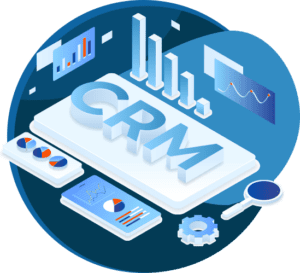
As an experienced commercial real estate broker or leasing agent, you know that long-term customer relationships are the key to success in your business.
Your tenants and clients have unique business challenges and the best way to become their favorite Landlord or Tenant Rep is to offer personalized services and exceptional customer service.
In other words, your tenants and clients should be confident that you’ll represent their property needs exactly how they want and allow them to focus on their businesses.
But to meet their expectations, you’ll need management tools like an integrated Customer Relationship Management (CRM) system that empowers you to make data-driven decisions and personalize your customers’ experiences and journeys with your business.
In this article, we’ll show you how a powerful tool like CRM can automate your commercial real estate and property leasing business and help you become your tenants’ and clients’ most trusted service provider.
Why use a CRM for property leasing?
Commercial real estate clients and tenants rely on commercial property reps to help them find warehouses, office spaces, retail locations, and other property types that align with their long-term goals and help them scale their businesses.
Your job is to foresee their challenges and ensure the property is on par and has everything they need to grow. But that’s a challenge in itself when you have dozens of clients and tenants with different requirements and needs.
This is where a customer relationship management (CRM) platform can do the heavy lifting for you.
A CRM for property leasing reps records, stores, and organizes your customer data in a central database. It provides you with all the critical customer information, helping you make more accurate and timely decisions.
With the right CRM system, you get the complete history of your customer interactions, and preferences, allowing you to foresee their challenges and offer tailored solutions.
Most importantly, it makes your business less reliant on you and allows you to scale it by building automated systems. In short, if scaling your business is a priority, using integrated CRM software for commercial real estate should be at the top of your list.
Types of CRM data you can use to enhance client relationships


The primary role of CRM software for property leasing is to track the complete customer journey across multiple touchpoints. Gathering all the critical customer data provides you with a 360-degree view of your existing customer’s preferences, allowing you to make data-driven and informed decisions.
Here are the various types of data you can leverage with a CRM:
Commercial real estate preferences
Commercial real estate is a vast industry with numerous segments. To offer personalized experiences, you must understand your customer’s business goals and the kind of assistance they want from you. With a CRM, you can record every customer’s property preferences individually, make them a part of their profile, and use this information to improve your services.
For example, a customer might want to acquire or rent a large office space for 1,500–2,000 employees in the city center with easy access to the subway station and banks nearby. A CRM platform would add this information to their profile, allowing your team members to find relevant opportunities.
Lease and transaction details
You can record your clients and tenants’ lease documents, transaction details, lease expiration dates, and other critical information in their CRM profiles. This serves as evidence of the transaction and increases operational efficiency and profitability.
Support interactions
Every time a customer contacts you by phone, email, or any other channel, a commercial real estate CRM records that interaction, making it a permanent part of the customer’s profile.
How to collect CRM data in commercial real estate



Switching from manual work to an integrated CRM system opens up numerous data collection and automation opportunities. Let’s discuss a few ways you can collect accurate customer data with a CRM
Integrating existing systems
Many commercial real estate brokers and leasing agents have no mechanism to connect or compile customer data in a central location. This data could come in several forms — from hard copies of customer information and offline Excel spreadsheets to emails, and advertising data.
A modern property leasing CRM like Act! seamlessly records and organizes this data into useful and actionable information for informed decision-making.
As a result, you can get a tenant or client’s real-time data in a central dashboard, saving you countless hours and increasing your business efficiency.
Website and landing pages
Property leasing companies invest in SEO and digital advertising campaigns to drive tenants and clients to their websites and landing pages. With the included API you can easily integrate these sources with your CRM to streamline data collection.
This way, you’ll know the exact source of a lead and its expectations from your business.
Email campaigns
Every commercial real estate client has unique needs. Interacting with your subscribers through email campaigns is a great way to understand their preferences and pain points. An integrated CRM tracks every email click and gives detailed insights into how your subscribers engage with your content. This helps you gather behavioral data, which is critical for personalizing customer experiences.
Feedback and reviews
The feedback from your tenants and clients helps you tailor your services to their needs. A CRM system integrates with your communication channels, like email, calls, and even social media platforms. As a result, every customer feedback email, complaint, or response is recorded, giving you priceless insights.
Putting your data to use
CRM tools help you with contact management, recording customer interactions, and turning them into actionable information. Here’s how you can use these insights to enhance your commercial real estate business.
Personalize customer experiences
Detailed CRM data, including contact information and customer satisfaction metrics, allows you to personalize customer experiences, create more relevant opportunities, and make every interaction more meaningful.
It allows you to understand tenant and client business needs, whether specific amenities, budget constraints, or location preferences, and tailor your communication and messaging accordingly.
Such comprehensive customer data also allows you to strategically segment your audience, create more relevant offers, streamline operations, and enhance lead management.
Proactively find relevant opportunities
When you know the requirements of specific customer segments, you can proactively hunt for relevant commercial real estate opportunities.
With all the data on past interactions, transaction histories, and client feedback, CRMs enable you to identify real estate trends and opportunities that may interest your clients before they even start looking.
So, instead of waiting for the clients to come to you, you can pitch them properties and partnership opportunities you know they’re looking for.
Automate follow-ups and customer interactions
You can improve your relationships with your commercial real estate clients by becoming their go-to source for all things related to property leasing.
Using an integrated CRM system, you can create personalized email workflows for tenants and clients, sharing valuable information and educational content.
You can also streamline your customer interactions by setting up follow-up sequences on pre-defined dates.
Nurture relationships with email marketing
The best real estate leasing companies invest in long-term customer relationships and focus on client retention for continued business growth. And there’s no better way to do that than email marketing.
By adding customers and prospects to your email list, you can send dedicated email flows to every customer segment. For example, you can share market trends, relevant property recommendations, pricing changes, and personalized content that simplifies decision-making, establishes brand authority, and feeds the sales pipeline.
So, when they need help buying, selling, or renting commercial property, you’ll be the first name that comes to mind.
Scale your commercial real estate business with CRM data


Data is your secret weapon for scaling and growing a commercial real estate business. The more you know about your audience, the better you can serve them.
If you haven’t used a real estate CRM yet, test drive Act! for Commercial Real Estate for free and find out how a CRM solution can elevate your property leasing services or commercial real estate business and help you grow faster.




